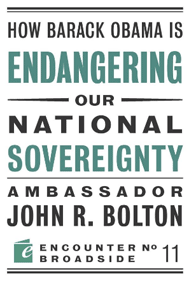How Barack Obama is Endangering our National Sovereignty by John R. Bolton. New York: Encounter Books, 2010. 48 pp. $5.99 (paperback).
 Small books can pack a big punch—as proven by John Bolton’s latest, How Barack Obama is Endangering our National Sovereignty. In fewer than fifty pages, the former U.S. ambassador to the United Nations shows that American sovereignty is under siege and indicates what concerned Americans must do to save it.
Small books can pack a big punch—as proven by John Bolton’s latest, How Barack Obama is Endangering our National Sovereignty. In fewer than fifty pages, the former U.S. ambassador to the United Nations shows that American sovereignty is under siege and indicates what concerned Americans must do to save it.
Bolton starts by observing that American sovereignty means that Americans have control over their own government. Given this, says Bolton, “advocates of ‘sharing’ or ‘pooling’ U.S. sovereignty with international organizations . . . are really saying we should cede some of [that] sovereignty.” This, he continues, “is unquestionably a formula for reducing U.S. autonomy and reducing our control over our own government” (p. 4).
According to Bolton, Barack Obama is “the first post-American president—someone who sees his role in foreign policy less as an advocate for America’s ‘parochial’ interests and more as a ‘citizen of the world,’ in his own phrase” (p. 10). The danger posed by this “citizen of the world” notion becomes increasingly clear as Bolton proceeds to identify imminent and long-term threats in a handful of critical areas, including domestic law, national security, and economic policy.
Where domestic law is concerned, Bolton says that “many in [the Obama] administration are doing their utmost to subvert America’s well-deserved reputation for rule of law by subordinating it to the dangerous concept that international law . . . overrides our domestic law, including in the judiciary” (p. 22). A case in point on which Bolton focuses is Obama’s insistence on “trying as many terrorists as possible in civilian courts, under ordinary criminal law procedures, rather than in military tribunals” (p. 24). Although Obama, and many others, say that this “norms” America with the internationally accepted method of dealing with terrorists, Bolton disregards that standard entirely: “Why we should defer to international ‘norms’ is, to say the least, unclear” (p. 24). The existence of such “norms,” he adds, “should not dissuade us even slightly from legitimate self-defense efforts” (p. 25).
But if Obama insists that we adopt these “norms” and treat terrorists like civilians, why did he approve the use of drones in Afghanistan and Pakistan, robots that clearly do not read terrorists their Miranda rights before killing them? Bolton holds that Obama simply has not reconciled that policy with the policy he supports domestically. Further, says Bolton, treating terrorists within the U.S. as criminals while treating them overseas as military enemies raises a serious danger to our security: “[W]hat conclusion will terrorists draw if they realize that, as with the Christmas Day 2009 bomber, you are likely to be safer if you attack the United States in its homeland rather than in the ‘Af-Pak’ mountains?” (p. 32).
Bolton also rejects the idea, held by Obama and many of those around him, that America should fear “isolation” from the international community. He says that such fears “constrain our ability to act in self-defense” (p. 18). He points out that Obama’s desire to “engage” with the international community by entering the UN Human Rights Council “has had no effect on council decisions” while giving it “a legitimacy utterly lacking in our absence” (p. 31). And he concludes that: “While being ‘isolated’ in international bodies may be uncomfortable . . . it often may be the only way to protect our sovereignty and our interests” (p. 18).
Regarding economic policy, Bolton discusses various attempts “to give global organizations taxing power independent of national governments” (pp. 32–33).
The issue of international taxing authority will be increasingly prominent and is an issue even in long-standing treaties that President Obama is trying to ratify, such as the Law of the Sea Treaty (LOST). “Royalties” from undersea mining activities to fund the international authority created under LOST should be understood as one of the treaty’s key defects and a dangerous precedent for future “self-funding” international regulatory schemes. (p. 34)
Bolton mentions other such attempts and points out that many of the schemes “contain tribunals with unchecked judicial or prosecutorial powers.” “This increased delegation of national authority,” says Bolton, “translates as transferring more and more of our own governance beyond our effective constitutional control—and more erosion of U.S. sovereignty” (pp. 35–36).
After identifying other such threats, Bolton ends his book with a warning and a call to action:
We must take threats to American sovereignty and efforts to expand the scope of global governance seriously. Failure to do so, and its inevitable consequences, will only be our fault. As James Madison said in 1788 during the debate over ratifying the Constitution, “[T]here are more instances of the abridgement of the freedom of the people by gradual and silent encroachments of those in power than by sudden and violent usurpations . . .” (p. 42)
Taking our sovereignty seriously requires understanding the elements of American domestic and foreign policy that threaten it. For this reason, Bolton’s book is itself an important part of the fight to preserve American sovereignty, and thus American liberty.


![[TEST] The Objective Standard](https://test.theobjectivestandard.com/wp-content/uploads/2017/10/logo.png)











